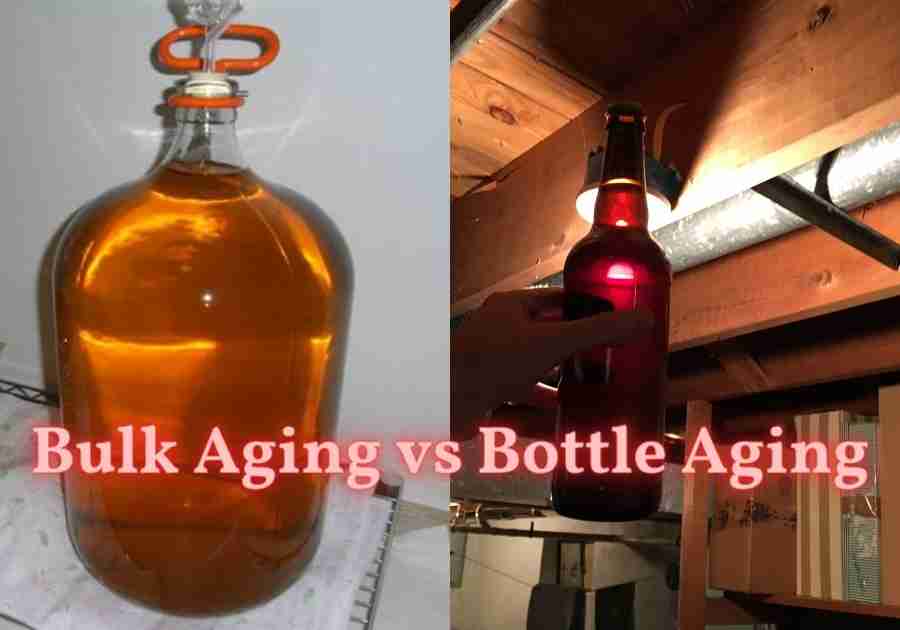As you start getting into making mead, one of the things you hear is that mead will need time to age. Now, I’ve heard of people making very good meads with little to no aging and other meads that have aged a while and still don’t taste great.
Yes, mead improves with age. As mead sits aging in the bottle it will undergo a type of mellowing that will allow some of the subtle flavors to come forward while other less desirable flavors will retreat. It will still remain the same for the most part, but some flavors move forward while others retreat.
There’s a bunch of things you should know about aging mead that will determine how your final product comes out. We’ll cover the various things you need to know below.
Why age mead?
The reason that you should age mead is that most meads come off very alcohol forward when they are first brewed. Most meads are over 12 percent alcohol and with that much alcohol it’s very strong tasting when it’s young. When you age mead, you’re allowing the alcohol to melow over time. When you first bottle your mead, the strong alcohol content will taste like rocket fuel most of the time. This taste will go down with age and make all the other flavors in your mead to come forward.
I have made multiple meads and after the months it takes to make, it’s very easy for me to just want to dive in and start drinking it. Most of the meads I have made were simply not ready to drink as they were too strong. I’d be lying to you if I said I didn’t drink some right away, but without doubt, if I had left those meads to age they would have tasted much better. I know this because I managed to not drink all of it right away and found some years later in my basement hiding away for years. After years, the taste was considerably better.
What is happening as the mead ages?
When you are aging your mead, a chemical reaction will occur with all the sugars, acids, and various other compounds that are in your mead. The longer this chemical reaction occurs the better your mead will be.
This chemical reaction will allow all the subtle flavors to come forth and mature. The specifics on these chemical reactions are pretty complex and so as a rule of thumb, the more stuff you have in your mead, the longer it will take to fully mature.
For example, lighter meads likely won’t need as much time to age compared to a sack mead or melomels. I’ve had very light meads that were good at 12 months that really didn’t see much improvement when I opened a bottle of the same mead past that. On the other hand, I’ve had some very complex spiced melomels that benefit from multiple years of aging. The trick is to have multiple bottles and test them over time.
How long should you age mead?
It’s hard to put an exact time on how long you should age your mead as everyone has a different preference. It’s a good idea to test your different meads that you make by opening them over various time periods and comparing how they taste.
I would say that you should shoot for a minimum of bottle aging your mead by 6 months. This is after the time it takes for primary fermentation and bulk aging in your carboy. If you can manage, try to shoot for 3 years aging your mead. I’ve found that after 1 year of aging, my meads turn out pretty good, but can still benefit from aging.
At 3 years, I have found that they have pretty much maximized their potential. As you can see, this presents a problem because I want to drink my mead and don’t want to wait that long. So the answer is that I try to continually make some new batches and will find a way to save a couple bottles per batch to age longer.
As you can see, this can start to become a lengthy process, but believe me when I say that it’s worth it.
How should you age mead?
Now that we’ve determined that aging your mead only benefits you, the question then becomes how exactly do we age the mead? Believe it or not, there’s more to it than just letting your mead sit around. You want to take care of your mead so that when you’re aging it, you’re doing it properly and not waiting 3 years only to find out that your aging process messed it up.
First thing to consider when aging mead is whether you are going to do bottle aging or bulk aging. Bulk aging is just aging all of your batch at the same time in a large carboy. Bottle aging is of course aging in the bottle. I would personally recommend doing both with the majority of the aging coming in your bottles.
The reason you want to bulk age first is that you want to make your whole batch somewhat uniform. Bulk aging also allows you to age your mead on top of fruit, spices, or oak to impart those specific flavors on your brew. However, this also opens you up to concerns of oxidation and space concerns of having to have a giant jug of mead around.
Bottle aging by contrast allows you to control smaller amounts of your batch easier. It also allows you to set it and forget it and not have to worry about losing your whole batch.
Either way, you’re going to want to consider oxidation, temperature, and light, as these three factors can make or break your mead. When bulk aging, minimize the amount of headspace in your carboy by using a narrow neck carboy and filling it all the way to the top. You should also consider using sulfites which will eat all the free oxygen that is left and keep it free from your batch. You should also consider keeping reracks to a minimum to avoid more oxygen coming into contact with your mead.
When you move to bottle aging, consider using a #9 cork as these will create a more snug fit. As with bulk aging, you want to keep headspace to a minimum. Do this by inserting your corks all the way in and filling your bottles up to a few millimeters from where the bottom of the cork lies.
Try to age your mead in a cool dark place. Exposure to light could oxidize the mead and higher temperatures could accelerate the aging process.
Conclusion
Mead absolutely benefits from some type of aging. How long you are able to wait is really up to you, but make no mistake, if you are able to withstand temptation, a much better mead awaits you down the line!


